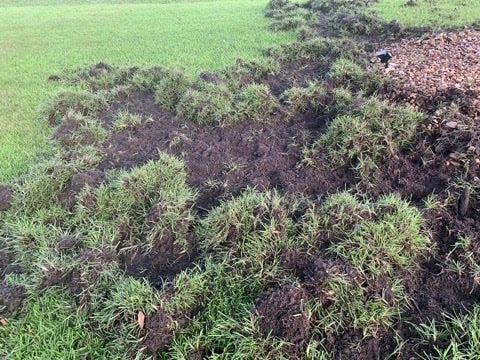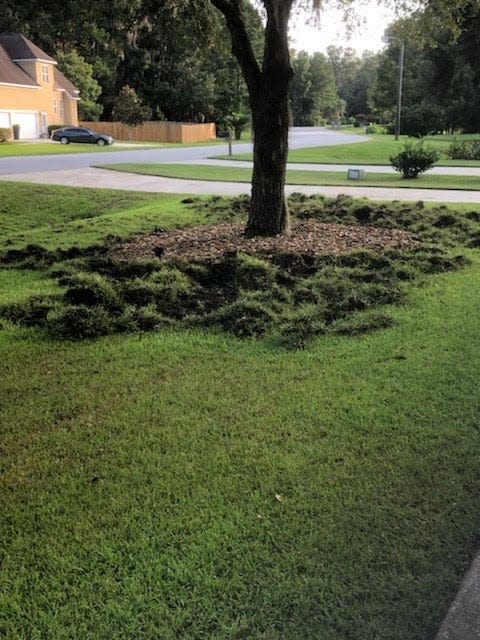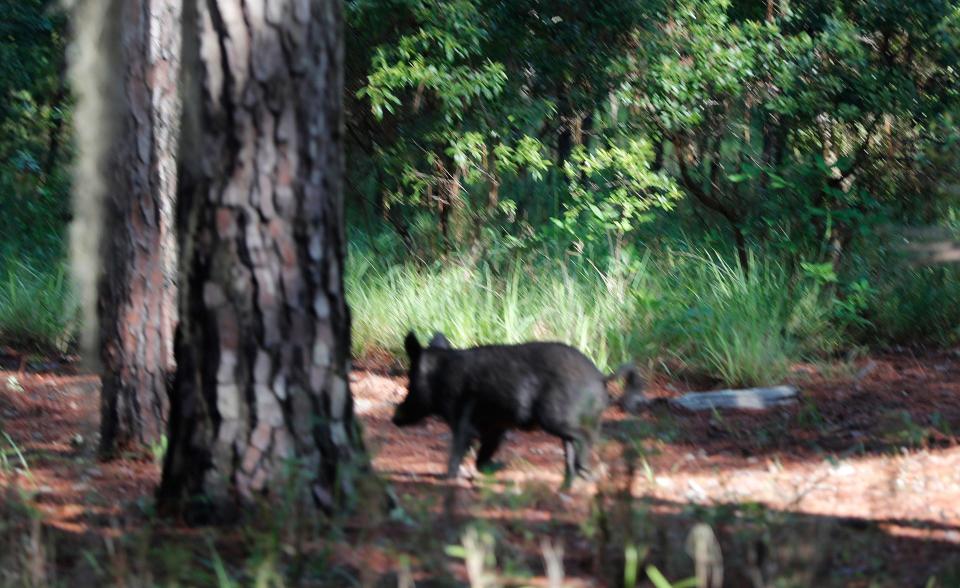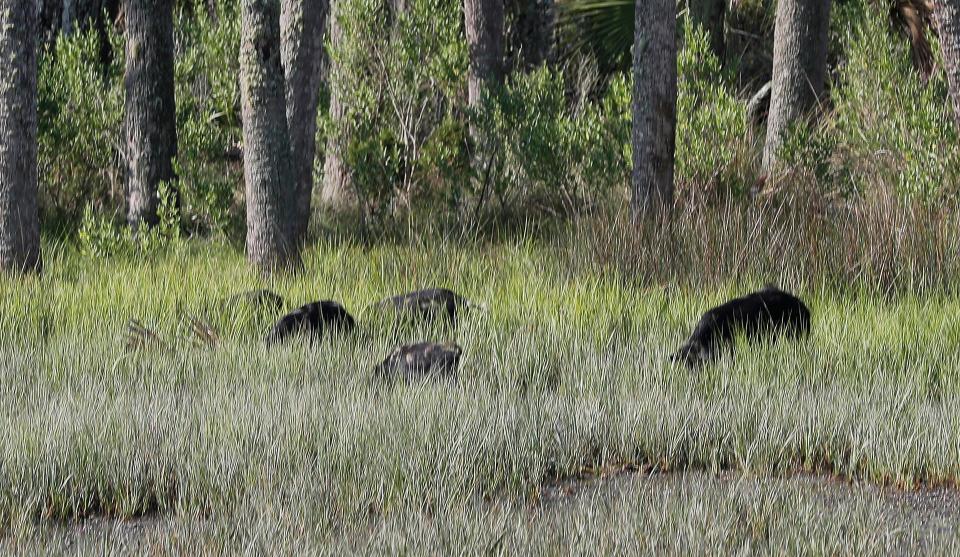Hog wild: Even with development looming, feral swine likely here to stay in Georgetown
Residents of Georgetown have plenty to bond over: their shared neighborhoods, local school sports games and community events. But nothing bonds neighbors quite like sharing a good, old-fashioned enemy. In this circumstance, that enemy is feral hogs.
"I've actually been sitting outside on my doorstep at five o'clock in the morning every morning, there with a cup of tea, waiting to scare these pigs off. That's how bad it's gotten," said Paula Maplesden, a resident of Georgetown.
Maplesden said she knows she sounds crazy, but she's at her wit's end.

Dealing with major damages
Maplesden is one of the many unlucky Georgetown neighbors plagued by bands of roaming feral hogs tearing up yards in the Savannah suburb. The hogs can weigh hundreds of pounds and cause tens of thousands of dollars in property damage while rooting through the ground for grubs and other food.
When she moved into her house and laid new turf, Maplesden said that's when the feral hogs first arrived. It cost thousands of dollars to fix the yard, but as soon as it rained the hogs returned several times, damaging the lawn all over again.
Related: First City Progress: Georgetown fights 400-home subdivision over traffic, feral hogs
More: Ossabaw Island's feral hog eradication leads to rebounding sea turtle nests, stable environment
She's tried everything: grub killer, ultrasonic sensors, and waiting in the early morning hours to scare the pigs because she's heard they have good memories and will avoid a place they've been scared off from. They've come back so many times she said there's no point in completing the costly repairs to the yard until the hogs stop.
Maplesden said the feral hogs are a pretty frequent sight in Georgetown. People regularly post pictures on neighborhood forums of the pigs brazenly out in the middle of the day, starkly contrasting their suburban backdrop. In the comments of the posts, people discuss the property damage, where they come from and how to get rid of them.
Development on hog territory
When the feral hogs ride in on cloven hoofs, Maplesden said they come from woodlands behind the houses in her neighborhood. She doesn't know if it was the dry weather earlier in the summer disrupted their food sources, or if development is pushing the hogs into the neighborhood. Regardless of cause, the issue seems to be getting worse.
Growing development narrowing the feral hogs' wild habitat is a concern for Georgetown residents. At a public hearing this month for a proposed 400-house development on Wild Heron Road, neighbors voiced concerns that building on forested areas rumored to contain hundreds of pigs would flush them out of the woods and into the streets.

Allison Colter, a wildlife biologist from the Georgia Department of Natural Resources, said this concern isn't far-flung. She said that feral hogs — an invasive species to Georgia — are habitat generalists, spectacular at adapting to any conditions and willing to live just about anywhere. When development comes, they don't tend to tuck tail and run toward the woods: they improvise, adapt, overcome.
Colter said the hogs do more than disrupt yard aesthetics. They contribute to erosion when they dig up root systems, and without many natural predators they repopulate quickly, with each sow able to have two or three litters of six or seven babies a year, making it hard to control population numbers.
Even with development paving over forested areas, feral hogs find food, Colter said. As omnivores, they'll eat anything from salamanders to worms to the veggie du jour of your garden.

More: First City Progress: Hargray expanding fiberoptic internet to islands, Georgetown homes
What can be done?
City and county animal services don't handle hogs, and the DNR controls hogs mainly on public lands. DNR usually sends concerned residents to the U.S. Department of Agriculture.
If the hogs are causing trouble in yards and people can't "take care of them" due to local gun ordinances or other reasons like home owner association policies, Colter said the USDA can come trap or kill the hogs at night. If it's an emergency, like a feral hog in a tussle with a pet dog or if the hog is stuck in a backyard, DNR will handle the situation at that time.
Unfortunately, as hogs adapt to being close to roads and unafraid of cars, development is unlikely to deter them.
"They get used to people, and just like they've learned to move along our interstate they get used to cars passing. It's no big deal," Colter said. "I imagine they would just adapt (to new subdivisions)."

An exception, Colter said, could be fences. Just like a turtle might change patterns if there is a fence, hogs could be forced to find other ways around town.
"I think all of us in DNR wish we had the resources to be able to do more trapping," Colter said, but with a small team handling about 100,000 acres of public lands, it's a challenge to keep the hogs at bay.
For homeowners looking for more information on feral hogs, visit the USDA's Wildlife Services website at bit.ly/3CHosQD.
Homeowners having direct impacts and damage from feral hogs can contact the USDA's Animal and Plant Health Inspection Service feral swine damage program at 866-487-3297, ext. 206.
Marisa Mecke is an environmental journalist. She can be reached at mmecke@gannett.com or by phone at (912) 328-4411.
This article originally appeared on Savannah Morning News: Georgetown residents battle feral hogs during development

